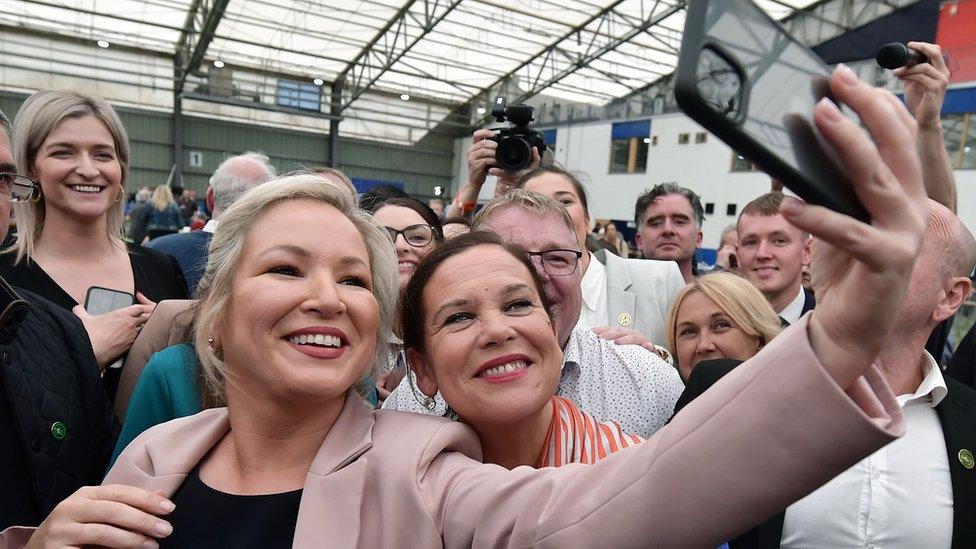NI council elections 2023: Restore Stormont Executive now, Sinn Féin urges
- Published
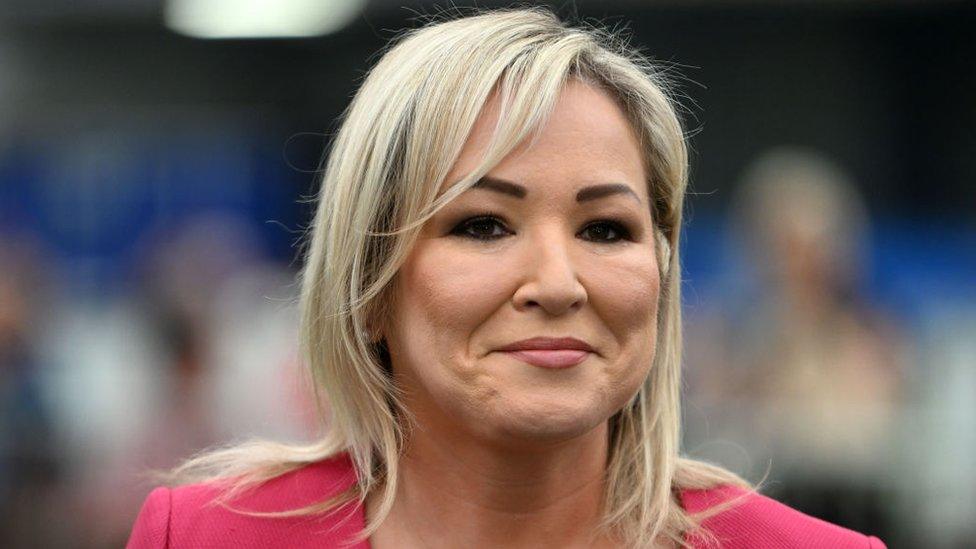
Voters have sent a clear signal to restore power sharing at Stormont, said Sinn Féin's Michelle O'Neill
The Democratic Unionist Party (DUP) must return to power-sharing government at Stormont, Sinn Féin's vice-president has said as her party clinched a second historic election win in 12 months.
Sinn Féin is now the largest in local government as well as the assembly.
It won a total of 144 seats after Thursday's council election - a rise of 39 on its 2019 showing.
Michelle O'Neill said the result showed voters want Northern Ireland's governing executive back.
The power-sharing government collapsed last year as part of the DUP protest against post-Brexit trading rules.
The party has also blocked the functioning of the Northern Ireland Assembly.
The overall turnout for the election was 54.7%, up from just under 52.7% in 2019.
The DUP, now the second largest party in local government, won 122 seats, the same as four years ago.
The cross-community Alliance Party had a positive result, increasing its number of councillors by 14 to 67.
Having come third in last May's assembly election, the gains mean the party takes up the same position at council level.
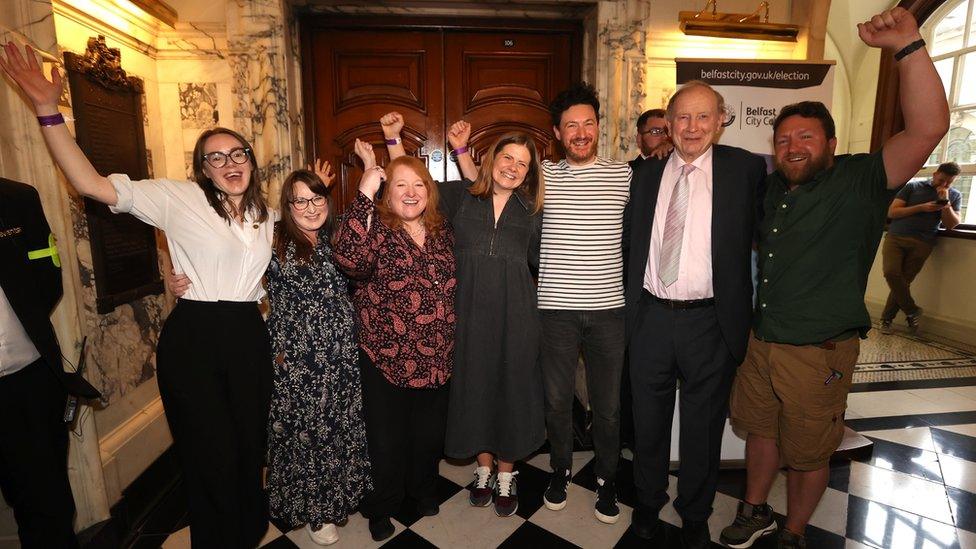
The Alliance Party increased its number of councillors to become the third largest party in local government
However, there were net losses for the Ulster Unionist Party (UUP) and the Social Democratic and Labour Party (SDLP).
The leaders of both parties, Doug Beattie and Colum Eastwood, dismissed any suggestion they would leave their positions after the election.
In Belfast, the leaders of both the Progressive Unionist Party (PUP) and the Green Party in Northern Ireland lost their council seats.
'Clear signal'
Ms O'Neill hailed what she called a "momentous" result, after her party made breakthroughs across Northern Ireland, including having its first councillors elected in Ballymena and Coleraine.
It emerged as the largest party in four councils: Mid Ulster; Derry and Strabane; Armagh, Banbridge and Craigavon; and Newry, Mourne and Down.
It will also have overall control of Fermanagh and Omagh, after winning 21 out of 40 seats.
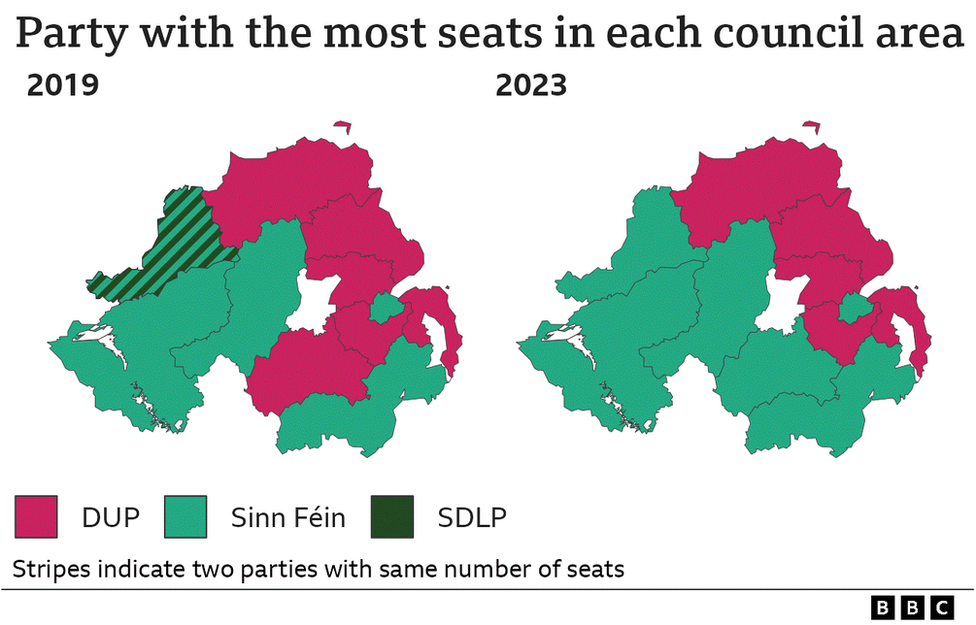
"These results are a positive endorsement of Sinn Féin's message that workers, families and communities need to be supported, and that the blocking of a new assembly by one party must end," she said.
"This election was an opportunity to send a clear signal."
She said the onus was now on the British and Irish governments to focus efforts on the immediate restoration of the Northern Ireland Assembly, and called for an urgent meeting of the British-Irish Intergovernmental Conference.
Her party colleague and MP John Finucane told BBC's Sunday Politics that people voted for the party because they want to see "parties working together".
"There should be an acceptance that the people have spoken now twice within the past 12 months, the voice is getting louder.
"The British and Irish government I think need to pay heed and attention to that voice and need to now take action to prioritise the restoration of our assembly."
'Voters fed up'
The DUP will be the largest grouping in three councils: Lisburn and Castlereagh; Mid and East Antrim; and Ards and North Down.
The unionist party will also have the largest number of councillors in Antrim and Newtownabbey and Causeway Coast and Glens councils.
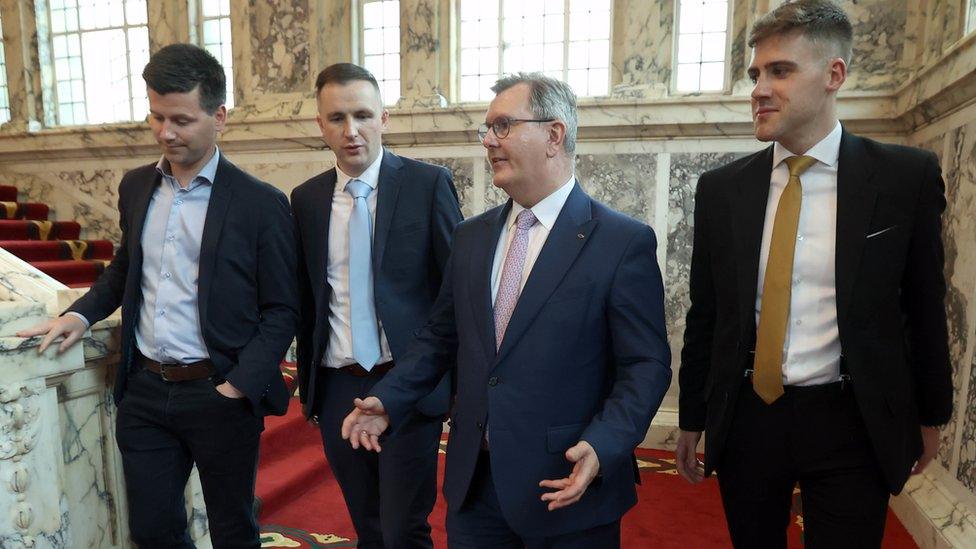
Sir Jeffrey Donaldson (second from right) joined party colleagues as results were declared in Belfast
DUP leader Sir Jeffrey Donaldson said there were lessons to learn from the results, which showed voters were fed up with unionist bickering and infighting.
"The DUP has had a good election but unionism needs to do better, we need to be winning more seats," he said.
DUP assembly member Jonathan Buckley told Sunday Politics that voters had backed the party and that it had stood up "to get a fair and balanced outcome that can restore devolution".
He added that a three-way split in the unionist vote - between the DUP, Ulster Unionists and Traditional Unionist Voice (TUV) - was "dispiriting the unionist electorate".
"It's the number one issue on the doors, unionist voters want to see unionist parties working together for the best interests of Northern Ireland."
Mixed feelings for Alliance, UUP and SDLP
However, Ulster Unionist councillor Philip Smyth said he believed there was a pro-union majority in Northern Ireland but that people were not coming out for to vote unionist.
"The big question for me is how does unionism kick on from here, we need to be able to sell a positive message and we cannot rely on the core vote," he told Sunday Politics.
"We need to target younger voters and non-traditional audiences."
Alliance assembly member Eoin Tennyson told the programme it was a "fantastic election" for the party but there was disappointment in Derry and Strabane where they lost their only two seats.
Mr Tennyson said the party's vote in the area largely held up but it was the Sinn Féin vote that "changed the dynamics".
The party largely failed to make targeted gains west of the Bann, but Mr Tennyson said there were bright spots such as in Enniskillen and Limavady.
Meanwhile, SDLP MP Claire Hanna said it was "a tough election and we knew it was going to be".
Allow X content?
This article contains content provided by X. We ask for your permission before anything is loaded, as they may be using cookies and other technologies. You may want to read X’s cookie policy, external and privacy policy, external before accepting. To view this content choose ‘accept and continue’.
Leader Colum Eastwood has come under pressure, with former party assembly member Richie McPhillips tweeting it was time to step aside, but Ms Hanna said the party was in the process of modernising.
She said it had adopted a new plan in September but that the party was "turning around years, possibly decades, of failure to modernise and that requires all hands on deck".
In a statement, Secretary of State Chris Heaton-Harris congratulated those elected and said "stable and accountable local government is the best way of delivering on the issues" that matter to people in Northern Ireland.
"Alongside the new councils, it remains my hope to see the assembly and executive return to work, as laid out in the Good Friday Agreement.
"I remain in close contact with parties and will continue to do everything I can to facilitate the restoration of the executive."
You can listen to the BBC's 5 Questions On, where Ireland Correspondent Chris Page explains the significance of the 2023 council election.


- Published21 May 2023
- Published21 May 2023
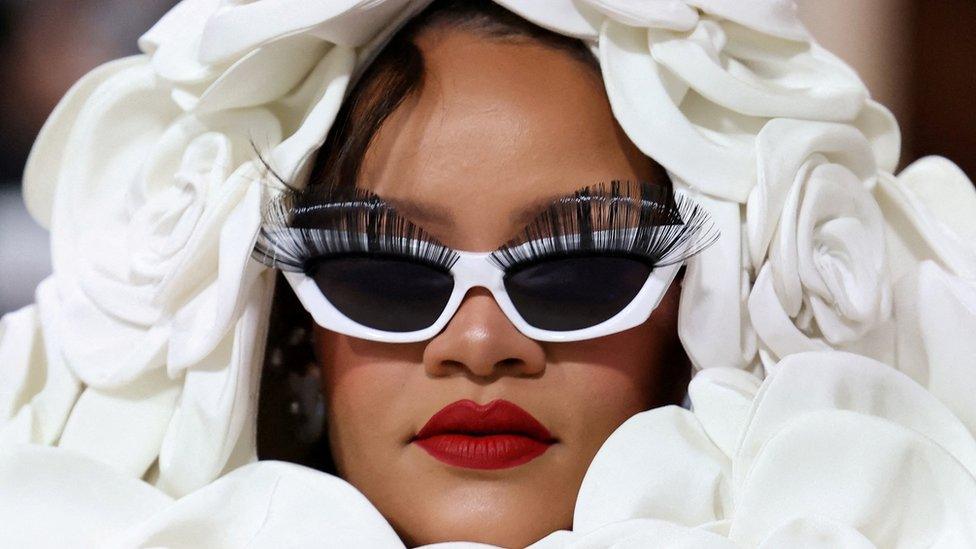
- Published2 February 2024

- Published8 May 2022
